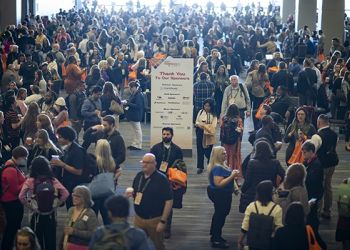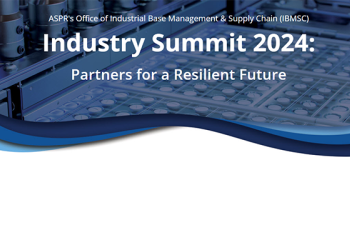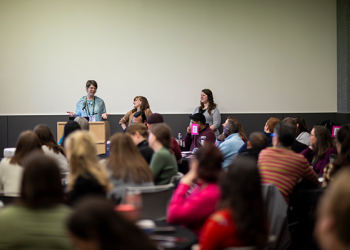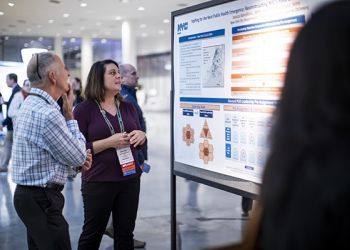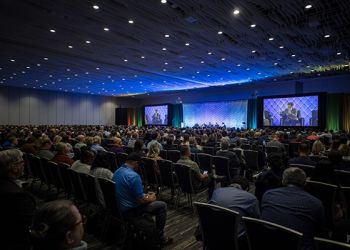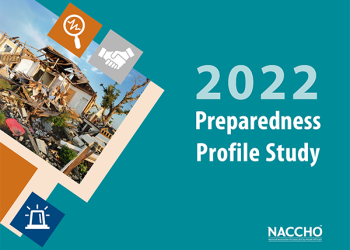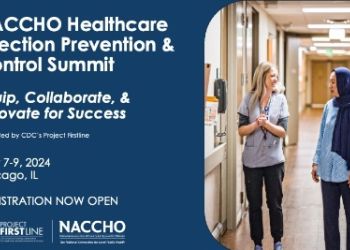On behalf of the Preparedness Summit Conference Planning Committee, thank you to all of the 2023 Preparedness Summit attendees, speakers, presenters, sponsors, and exhibitors for your enthusiasm and engagement from April 24 to 27. The Preparedness Summit hosted a record-breaking group of attendees with over 3,000 participating in Atlanta and virtually. The conference theme, Recover. Renew: Reprioritizing All-Hazards Preparedness, provided an opportunity to revisit pressing issues in preparedness and share resources, shape policies, and build skills to mitigate a variety of threats.
In-person attendees participated in over 200 sessions in addition to plenaries, poster sessions, Ted Talks, networking opportunities, and a robust exhibit hall. Eight Town Hall sessions allowed attendees to learn and share perspectives around key preparedness issues. A late-breaking session looked at the implications for practitioners around the end of the COVID-19 Public Health Emergency Declarations. A Preparedness Appreciation Reception featured notable speakers recognizing the collective contributions of the preparedness community. Many in-person attendees also participated in a scavenger hunt with clues dotted throughout the conference venue. Congratulations to the 45 scavenger hunt winners.
In addition to over 70 livestreamed sessions throughout the conference, virtual attendees had access to on-demand sessions. Additionally, resources from many of the keynote speakers are accessible to attendees along with session recordings via the online platform.
Monday: Preparedness in a Shared Environment: Renewing Our Commitment to One Health
NACCHO Chief Executive Officer Lori Tremmel Freeman, MBA, opened the conference by acknowledging the unchartered waters we are all facing as we navigate the end of the COVID-19 pandemic. She encouraged participants to listen, learn, and share their expertise while together and to take time to recharge and reflect before returning to their home communities.
NACCHO Senior Director of Preparedness Laura Biesiadecki, MSPH, welcomed attendees on behalf of the planning committee, inviting participants to take advantage of the opportunity provided by this year’s conference theme to look at all the issues the preparedness community has not been able to focus on over the past few years.
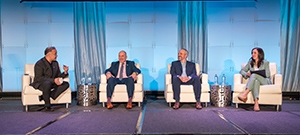
The opening plenary session, “Preparedness in a Shared Environment: Renewing Our Commitment to One Health,” explored how we can incorporate the concept of “One Health” into day-to-day planning and operations, and improve community resiliency into the future.
Dr. Umair A. Shah, MD, MPH, Secretary of Health, Washington, facilitated the discussion and opened the conversation by recognizing the interconnectedness of our environments, agencies, and systems. He urged attendees to move from factional to transformational health, transforming not just public health, but health in general.
Dr. Herbert Wolfe, MHS-PA, Acting Chief Medical Officer, Office of Health Security, U.S. Department of Homeland Security, shared that nearly every homeland security threat over the past 20 years has had a nexus to public health. He stressed the importance of focusing on healthy people and healthy animals, and the need for an integrated approach as we work together to have a greater impact on the health of our communities.
Dr. Colin Basler, DVM, MPH, Deputy Director, CDC One Health Office, CDC One Health Liaison to WOAH, talked about some of the One Health work being done at the CDC at the global and domestic level. He noted that One Health is becoming more important in recent years as more people live closer to wild animals. He talked about One Health providing a mechanism to detect, respond to, and prevent disease threats, and about intergovernmental agency and partner collaboration to address public health.
Dr. Mary-Margaret Fill, MD, MPH, Deputy State Epidemiologist, Communicable and Environmental Diseases and Emergency Preparedness, State of Tennessee, provided a state perspective on the integration of One Health, explaining how it is imbedded into Tennessee’s preparedness framework. She shared examples of the principles of One Health in action, demonstrating how a long-term, sustained investment in capacity building has been valuable to planning and response.
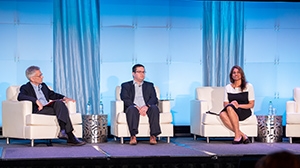
In the late-breaking session, “The End of the Public Health Emergency Declaration,” attendees heard from noted public health analysts about what is expected to change as a result of reaching this milestone. They also heard from state and local public health officials about how they are planning this change within their own agencies. Speakers included:
- John Auerbach, Senior Vice President, Federal Health, ICF
- Jen Kates, PhD, Senior Vice President; Director, Global Health & HIV Policy, KFF
- Andrew Pickett, Director, Bureau of Emergency Preparedness & Response, Pennsylvania Department of Health
- Dr. Meenakshi G. Brewster, Health Officer, St. Mary’s County, Maryland
All are invited to continue the conversation from this session. Help us get the answers you need to your questions regarding the end of the public health declaration. Please complete this survey—the open-ended questions are the most important.
Tuesday: Paths to Recovery: Empowering Resilient Communities
The second plenary session explored grassroots resilience efforts around the country and the world and the vital conditions necessary to support equitable recovery.
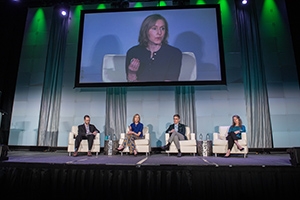
Daniel Aldrich, PhD, Professor of Political Science, Public Policy and Urban Affairs, Northeastern University, moderated the discussion. He opened the conversation noting that too much time is spent in response and not enough in development. He encouraged participants to break the current cycle and look at what we are doing in order to be resilient in the future. Aldrich stressed that mental health and social ties are at the forefront of recovery.
Erin McDonald, PhD, MPP, Lead, Equitable Long-Term Recovery and Resilience Plan, U.S. Department of Health and Human Services, opened by asking how we can support communities to thrive and how we can better leverage resources for all communities. She stressed the need to address both short- and long-term needs. McDonald noted her excitement at the work happening across the federal government and in communities to build resilience.
Neil Brockway, Director, Disaster Risk Reduction, American Red Cross, acknowledged that the frequency and magnitude of disasters is speeding up. He cited a fundamental need for relief and response organizations to re-engage and re-evaluate how they work. Brockway shared examples from the American Red Cross’ Community Adaptation Program as one strategy to support community resilience in partnership with hyper-local, grassroots organizations.
Abigail Goodwin, MA, MPH, Executive Vice President, Palm Health Foundation, talked about the importance of recognizing that those people closest to challenges have the best solutions. She spoke about how her organization has centered its work around the hope and belief that we can do better and can harness the power of shared purpose and spiritual capital.
Wednesday: Convening the Preparedness Community
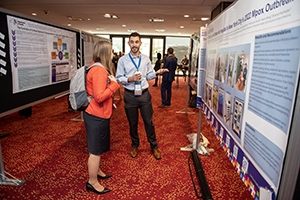
Wednesday featured eight partner and policy Town Hall sessions that convened the preparedness community to share important updates on pressing issues and hear feedback with presenters and peers. Topics included:
- Data Modernization: The Roadmap for Moving Faster than the Disease
- DHS Office of Health Security: Evolving to Meet the Mission
- Hacking Healthcare – How to Protect Yourself Against Digital Threats
- Sneak Peek: Next Generation of Public Health Emergency Preparedness (PHEP) – Key Strategies for the Next Five Years
- ASPR Town Hall
- Paperwork, Processes, and Preparedness: Health Departments’ Lessons Learned and the Future of Administrative Preparedness
- Right into the Danger Zone: Cleaning Up After Biological & Chemical Incidents
- Utilizing Public Health Emergency Preparedness (PHEP) Resources to Respond to Mpox
The day concluded with the Summit’s first Preparedness Appreciation Reception to uplift, honor, and celebrate our community of public health heroes. Throughout the evening, speakers commended the relentless, arduous work of all local health departments, MRC units, and other agencies, who have worked tirelessly to keep our communities safe, not only during the pandemic, but every day.
Thursday: Reprioritizing Climate Change in an All-Hazards World
The conference closed with a conversation about climate change, one of the most significant risks to public health and safety across our country and around the globe. Presenters shared what is happening at the federal and local level to advance this cause in an all-hazards world.

John Balbus, MD, MPH, Interim Director, Office of Climate Change and Health Equity Office of the Assistant Secretary for Health, U.S. Department of Health & Human Services, moderated the discussion, noting that the fundamental lesson from COVID-19 is that we need to address fundamental health disparities in order to reduce vulnerability and address climate change. He cited a need for investments in data, tools and technical assistance, and capacity building in workforce, as well as the need for revisions to policy in practice as investments that make financial sense.
Addison Houston, MCRP, AICP, Climate Adaptation Strategist/Environmental Health Emergency Response Coordinator, Healthy Community Planning & Partnerships, Climate & Health Equity Initiative, Public Health – Seattle & King County, shared local examples of efforts to mitigate and address the impacts of climate change. He shared that risk communications efforts focus on drawing connections between climate change and public health. Houston noted how data is helping his health department to better identify disparities and climate change’s impact on communities. He also referenced the increasing need for engagement with colleagues in environmental health.
Jason Wilken, PhD, MPH, Career Epidemiology Field Officer assigned to the California Department of Public Health, Centers for Disease Control and Prevention, noted that the impacts of climate change on human health may not fit neatly into a program. Instead, he called on public health professionals to connect with partners to develop situational awareness and plans across perceived boundaries. He noted that events are leading to unequal climate vulnerability, reminding participants that while all are affected, not all are vulnerable.
Natalie Grant, MPH, Director, Office of Human Services Emergency Preparedness and Response, U.S. Department of Health & Human Services, spoke to the importance of integrating a range of educational and supportive programs and prevention strategies to enable communities to thrive. She reminded attendees that communities need support before, during, and after disasters and that disaster equity should be at the heart of planning efforts.
Conference Content Available On-Demand
In-person and virtual conference registrants can log into their account and access virtual content from the event here. Content will be available for 90 days post-conference.
What’s Next?
See recordings from Facebook Live sessions with conference poster presenters from Tuesday and Wednesday.
See photos from the 2023 Preparedness Summit.
Continuing education credits are available for in-person attendees. In order to receive continuing education (CE) for CM4668 2023 Preparedness Conference, please visit TCEO and follow these 9 Simple Steps before 5/27/2023. The course access code is SummitCE23.
Save the date for the 2024 Preparedness Summit in Cleveland, Ohio, March 25-28, 2024.
For more about the conference, visit www.preparednesssummit.org. Subscribe to the Preparedness Summit e-newsletter to get the latest news on the 2024 Preparedness Summit.

